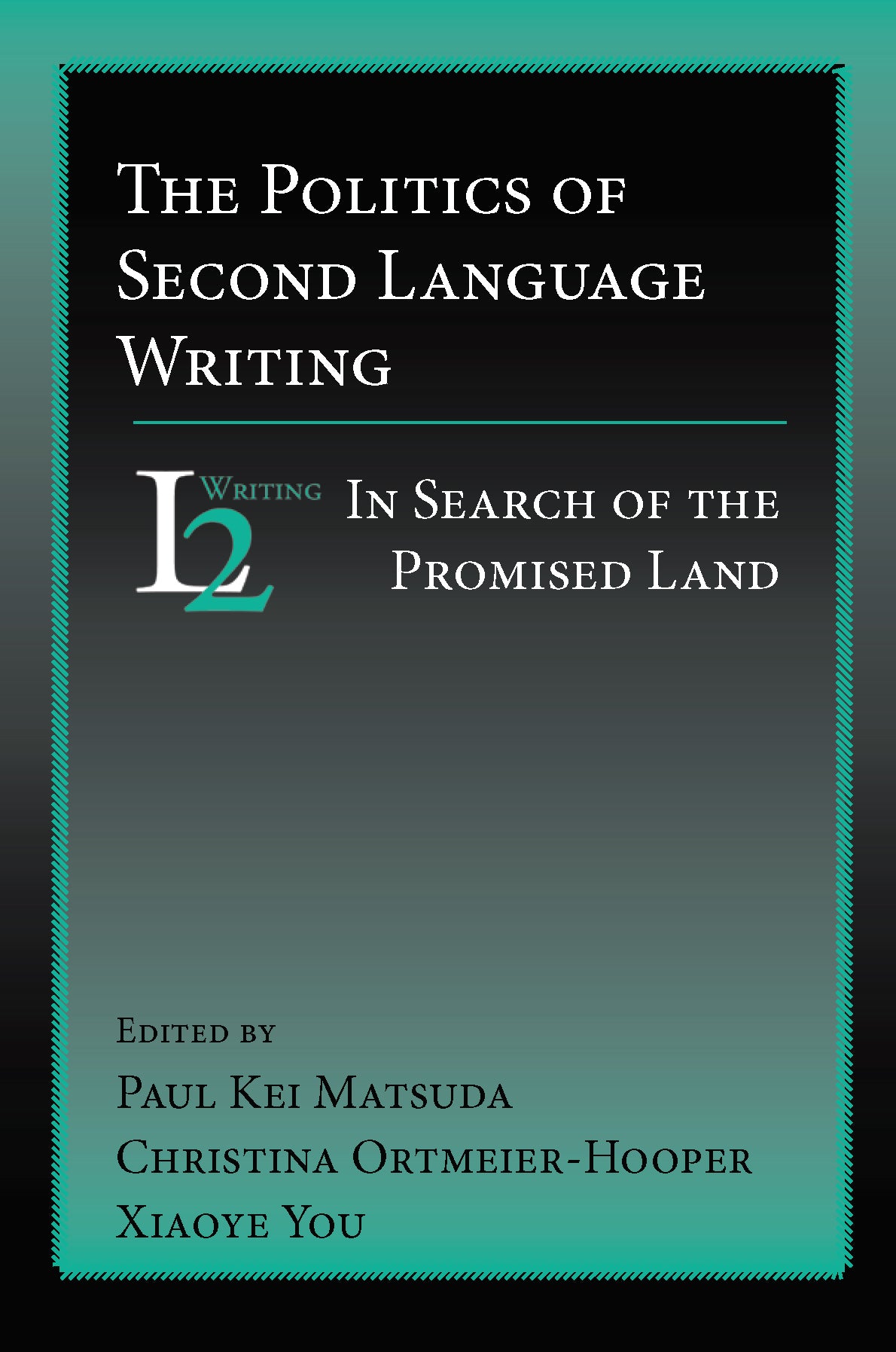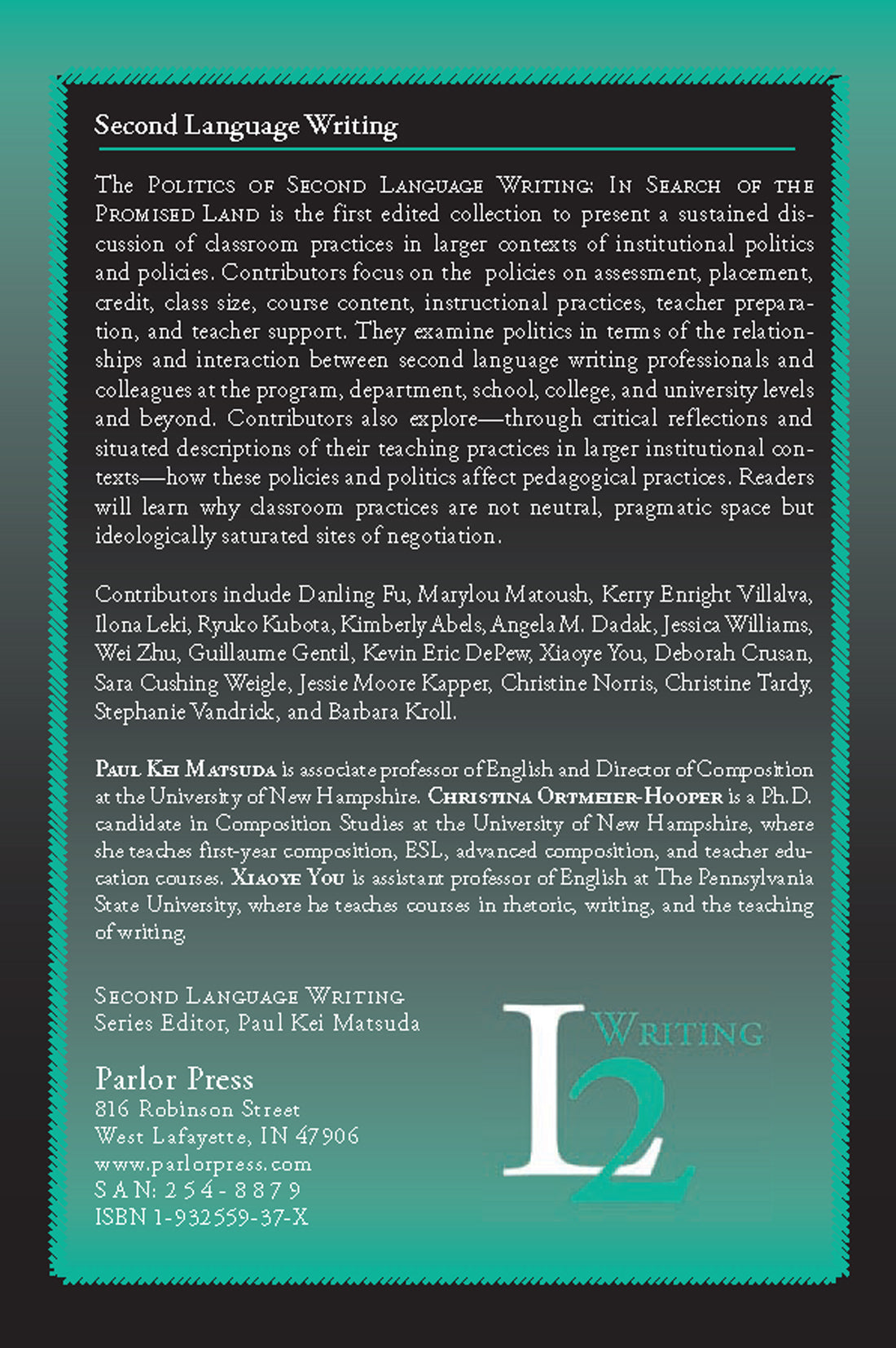Description
Edited by Paul Kei Matsuda, Christina Ortmeier-Hooper, and Xiaoye You
Second Language Writing Series
Edited by Paul Kei Matsuda
Information and Pricing
978-1-932559-11-8 (paperback, $30.00); 978-1-932559-33-0 (hardcover, $60.00); 978-1-932559-37-8 (PDF, $12.00; £7.00) © 2006 by Parlor Press. 336 pages, with illustrations, notes, bibliography, and index
Bookstores: Order by fax, mail, or phone. See our "Sales and Ordering Page" for details.
About This Book
The Politics of Second Language Writing: In Search of the Promised Land is the first edited collection to present a sustained discussion of classroom practices in larger contexts of institutional politics and policies. Contributors focus on the policies on assessment, placement, credit, class size, course content, instructional practices, teacher preparation, and teacher support. They examine politics in terms of the relationships and interaction between second language writing professionals and colleagues at the program, department, school, college, and university levels and beyond. Contributors also explore—through critical reflections and situated descriptions of their teaching practices in larger institutional contexts—how these policies and politics affect pedagogical practices. Readers will learn why classroom practices are not neutral, pragmatic space but ideologically saturated sites of negotiation.
Contributors
Danling Fu, Marylou Matoush, Kerry Enright Villalva, Ilona Leki, Ryuko Kubota, Kimberly Abels, Angela M. Dadak, Jessica Williams, Wei Zhu, Guillaume Gentil, Kevin Eric DePew, Xiaoye You, Deborah Crusan, Sara Cushing Weigle, Jessie Moore Kapper, Christine Norris, Christine Tardy, Stephanie Vandrick, and Barbara Kroll.
About the Editors
Paul Kei Matsuda is associate professor of English and Director of Composition at the University of New Hampshire.
Christina Ortmeier-Hooper is a Ph.D. candidate in Composition Studies at the University of New Hampshire, where she teaches first-year composition, ESL, advanced composition, and teacher education courses.
Xiaoye You is assistant professor of English at The Pennsylvania State University, where he teaches courses in rhetoric, writing, and the teaching of writing.
Contents
Preface
The Politics of L2 Writers In U.S. K-12 Schools
1 Writing Development and Biliteracy
Danling Fu and Marylou Matoush
2 Reforming High School Writing: Opportunities and Constraints for Generation 1.5 Writers
Kerry Enright Villalva
The Politics of L2 Writing Support Programs
3 The Legacy of First-Year Composition
Ilona Leki
4 Improving Institutional ESL/EAP Support for International Students: Seeking the Promised Land
Ryuko Kubota and Kimberly Abels
5 No ESL Allowed: A Case Exploring University and College Writing Program Practices
Angela M. Dadak
6 The Role(s) of Writing Centers in Second Language Writing Instruction
Jessica Williams
The Politics of English Writing for Academic and Professional Purposes
7 Understanding Context for Writing in University Content Classrooms
Wei Zhu
8 EAP and Technical Writing Without Borders: The Impact of Departmentalization on the Teaching and Learning of Academic Writing in a First and Second Language
Guillaume Gentil
9 Different Writers, Different Writing: Preparing International Teaching Assistants for Instructional Literacy
Kevin Eric DePew
10 Globalization and the Politics of Teaching EFL Writing
Xiaoye You
The Politics of Second Language Writing Assessment
11 The Politics of Implementing Online Directed Self-Placement for Second Language Writers
Deborah Crusan
12 Investing in Assessment: Designing Tests to Promote Positive Washback
Sara Cushing Weigle
The Politics of the Profession
13 Mapping Post-Secondary Classifications and Second Language Writing Research in the United States
Jessie Moore Kapper
14 Institutional Politics in the Teaching of Advanced Academic Writing: A Teacher-Researcher Dialogue
Christine Norris and Christine Tardy
15 Shifting Sites, Shifting Identities: A Thirty-Year Perspective
Stephanie Vandrick
Coda
16 Toward a Promised Land of Writing: At the Intersection of Hope and Reality
Barbara Kroll
Contributors
Editors
Index


